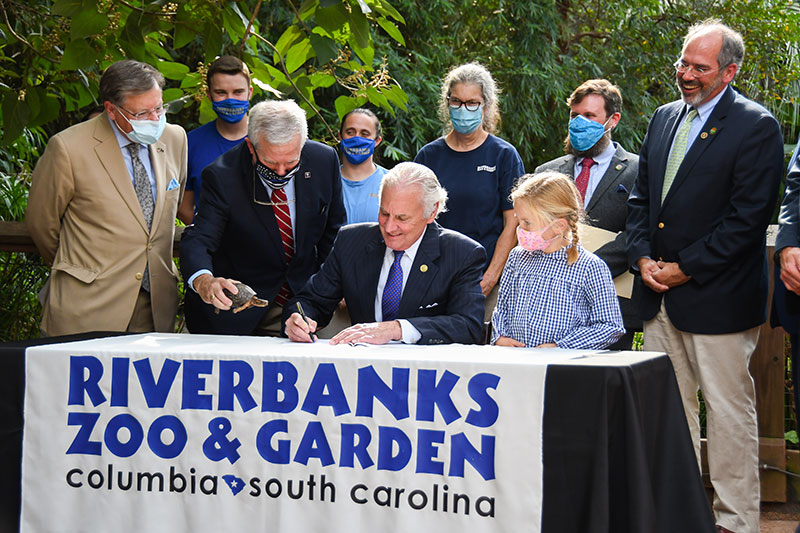October 21, 2020
Leaders from the S.C. Department of Natural Resources (SCDNR) joined Gov. Henry McMaster, key legislators and other stakeholders today at Columbia's Riverbanks Zoo and Gardens for a formal bill-signing ceremony to commemorate Act 177 of the 2020 legislative session. A new state law and attendant regulations enabled by Act 177 will provide significant protections for South Carolina’s native turtle populations, as well as other native reptiles and amphibians.

"We must continue to do all we can to protect and preserve South Carolina's native species, and this legislation will give law enforcement the tools they need to do just that," said Gov. McMaster. "This effort will go a long way to ensure that we and future generations can continue to enjoy all of South Carolina’s natural treasures."
The new law is a huge win for conservation and will allow South Carolinians to continue to possess and experience native reptiles and amphibians, while at the same time protecting them from exploitation. Under a set of proposed regulations developed by SCDNR biologists with extensive input from the reptile and amphibian enthusiast community, the sale, purchase or transfer of native reptile and amphibian species will be tightly controlled and limited to captive-bred animals that can be commercialized without harming native populations.
"South Carolina has long been targeted as a source for wild collected reptiles and amphibians and a center for illegal wildlife trading," said SCDNR Director Robert Boyles. "This law is an important conservation achievement that protects South Carolina's native turtles and other reptiles and amphibians. We are grateful for the support of our General Assembly, stakeholders, and the conservation community in helping to ensure a future where these species can thrive."
In a bipartisan process with broad legislative support, a House bill (H. 4831) addressing this issue was introduced by Reps. Bill Hixon of North Augusta and Randy Ligon of Rock Hill. A similar bill in the Senate was introduced by Sens. Vincent Sheheen of Kershaw, Chip Campsen of Charleston and Thomas McElveen of Sumter. Eventually, senators approved the House version of the bill, after its journey through the committee hearing process. Rep. David Hiott of Pickens, Chairman of the House Agriculture, Natural Resources and Environmental Affairs Committee, and Sen. Campsen, Chairman of the Senate Fish, Game and Forestry Committee, helped shepherd the bill through the legislative process.
The new law will address what has been a long-standing problem of commercial exploitation of wild-collected turtles in the Palmetto State, including species such as Eastern box turtles, spotted turtles and diamondback terrapins. These and other species are in high demand in the domestic and international trade. That, combined with the state's previous lack of laws or regulations governing the collection and sale of these animals, placed South Carolina at the center of a highly lucrative — and often illegal — international trade in these animals, and has led to the exploitation of in-state turtle populations.
A number of high-profile law enforcement cases in the last few years have focused renewed attention on this issue. More than 200 turtles bound for the black-market turtle trade were seized from a residence in Chester County in 2019. That followed a 2018 case which saw three South Carolina men plead guilty to conspiring to illegally buy and sell rare turtles on the black market.
Act 177 addresses those problems in several key ways: First, the new law limits the number of native turtles that an individual may possess to no more than 10 total (with individual limits of 5 on many common species and 2 on Eastern box turtles and diamondback terrapins). Residents of the state who currently have collections in excess of these limits will be given an opportunity to register with SCDNR (within 90 days) and receive a temporary permit "grandfathering" their current animals. The law also provides legal avenues for institutions such as zoos, research facilities and wildlife rehab organizations to continue their important work, also through a permitting process. In addition, the new law makes it illegal to "possess, transfer, sell, barter, trade ship or remove" from the state native reptile or amphibian species, including parts, products, eggs or offspring, in violation of a statute or a limit or permit condition established by SCDNR and directs SCDNR to promulgate regulations for the management of native reptile and amphibian species. It also prohibits the release of non-native wildlife (such as tegu lizards).
Information about the new laws and regulations related to reptiles and amphibians, as well as permit and registration forms needed by individuals who have current collections in excess of 10 animals or that are required for the legal sale/transfer of species permitted under the new regulations, can be found on the SCDNR website.
Media Contact:
Regional Public Information Coordinator
David Lucas at
LucasD@dnr.sc.gov
843.610.0096



